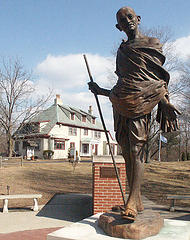 A statue of Mahatma Gandhi at the Peace Abbey, Sherborn, Massachusetts
A statue of Mahatma Gandhi at the Peace Abbey, Sherborn, MassachusettsThe subject of nonviolence is one that I've addressed here a couple of times before. I've wrestled and grappled with the whole idea, turning over the various moral dilemmas and practicalities in my mind in light of what I read in the clear words of Christ in the Gospels. Perhaps that is my whole problem... Look at the terms I use... Wrestling. Grappling.
Don, over at Reflections Of A Secular Franciscan, is a guy who seems to "get" nonviolence. Don can correct me if I'm wrong, but I believe he served in the U.S. Navy.
I urge everyone to read two superb posts he put up recently on the subject of nonviolence:
Romans 12
The Other
7 comments:
It must be my culture and the history of my old country: I do agree with the non-violence in certain limits. In my opinion self-defence and the defence of the innocents AND non-violence do not exclude each other.
Paula,
Yes, that has been the hardest part for me… What do we do to protect innocents under these circumstances? What do we owe to the defenseless?
I don’t think geography necessarily has a lot to do with it. America has been in almost a constant state of combat of one kind or another from it’s founding. Ours is a society with a great deal of social alienation, which drives the highest murder and incarceration rates among the Western democracies. We are the only Western democracy that practices capital punishment.
I know that the Romanian Revolution in 1989 was more violent than what occurred in the other Eastern Bloc nations, and that it may have been more of a coup than a revolution. It was not a “velvet revolution”. Still, the potential bloodshed that could have occurred in getting rid of such a brutal dictator could have been far worse. The tactics used by the people were similar as in the other Eastern countries. John Paul II led the way with the courageous, nonviolent Solidarity movement in Poland, and look how it set off the chain reaction in the rest of the Eastern European nations. Ultimately, the soldiers, police, and security forces in those countries decided that supporting communism was not worth the killing of their countrymen. They listened to their brothers and sisters
Jeff, i am thinking also at the hundred of years of defensive wars against the Otoman Empire. They wanted us as their slaves, ultimately. I cannot see how non-violence could be employed in this case.
Yep.A pure Ghandi non-violent approach in front of the Tatars would not have worked.
I love Gandhi.I like Don´s posts. Only that I consider the Gandhi approach as not made to work in the war against terrorism. This is all.
It appears that I am really out of general sync, here and on Crystal´s blog (the discussion about gays).:-). I am from a place and culture that you would clasify as "conservative" I think.:-).
Paula,
I don't know... I guess that in my life in the Church and in my time discussing religion on the web, I haven't come to expect people to be in sync all of the time.
I hope you feel that my door is always open for you here.
Jeff,
I do not trust things and changes done in a haste. That´s why I may appear conservative.:-).
I'm humbled by your recommendation. Yes, I am a US Navy veteran. I served as a Hospital Corpsman during the Vietnam era. I chose to serve in that capacity because even at the age of 19 (when I enlisted) I knew that I couldn't take a life. I have often thought of this decision. I will continue to do everything in my power to work for peace. I will pray and I will work for peace.
I believe that Gandhi and Martin Luther King faced terrorism and defeated it. The way of non-violence should never be confused with passivity. Gandhi and King's non-violence was both active and provocative. Peace and thank you. Don
Post a Comment